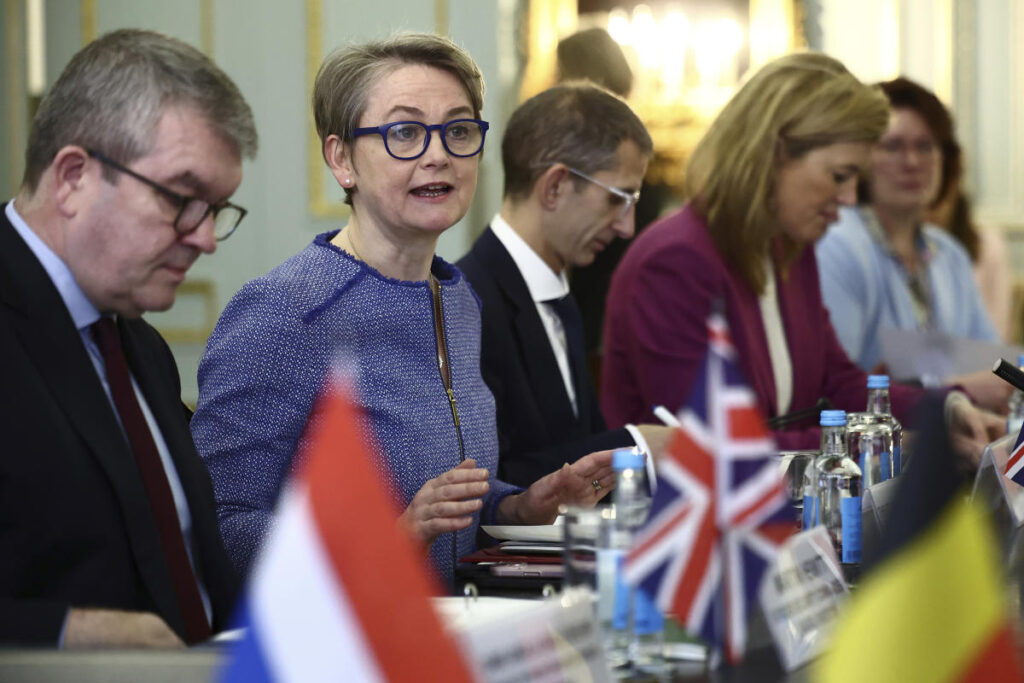In a significant move to combat human trafficking, the United Kingdom and Germany have committed to an enhanced collaboration aimed at addressing the urgent issue of people-smuggling gangs operating in the English Channel. This coalition was solidified during a meeting in London, where U.K. Home Secretary Yvette Cooper and German Interior Minister Nancy Faeser signed a “joint action plan.” The agreement marks an important step in tackling the dangerous maritime journeys undertaken by migrants using small boats, often facilitated by criminal organizations exploiting their vulnerabilities. Cooper emphasized the interconnected nature of these criminal networks, noting that they operate across multiple countries, including Germany, and pose serious risks to border security and human lives.
As part of the action plan, Germany has pledged to criminalize the facilitation of illegal migration to the U.K., bringing further legal pressure on those who enable these perilous crossings. This measure is particularly pertinent given that many of the inflatable boats used by smugglers are stored in Germany. Both Cooper and Faeser stressed the importance of cross-border law enforcement cooperation to effectively dismantle these criminal operations. By working together, the two nations aim to not only thwart smuggling attempts but also to enhance the safety and security of their borders.
In addition to legal measures, the cooperation will also focus on technological and intelligence-sharing aspects. Faeser highlighted the need to maintain “high investigative pressure” and to continuously monitor and investigate the financial aspects of these criminal enterprises. This systematic approach seeks to unravel the networks that underpin human trafficking, providing a better chance of bringing those responsible to justice. There is also a plan to remove promotional content related to migrant smuggling from social media platforms, which would disrupt the visibility and accessibility of these illegitimate services.
The plan was unveiled on the backdrop of a meeting of the “Calais Group,” a coalition that includes the U.K., Germany, Belgium, France, the Netherlands, and representatives from the European Union’s border and police agencies, including Europol and Frontex. This meeting represented a dialogue between various stakeholders in European security, all of whom are grappling with the ongoing migration crisis exacerbated by conflicts and economic hardship in several regions. The international collaboration is vital in developing cohesive strategies to combat smuggling and reduce migrant deaths in the English Channel—a crossing that has gained notoriety as one of the world’s most dangerous maritime routes.
The resurgence of dangerous crossings has been a point of contention for the U.K., particularly following Brexit, which has complicated relationships with European partners and disrupted established frameworks for intelligence sharing. The current British government is, therefore, prioritizing the rebuilding of ties and trust with neighboring countries to facilitate more effective law enforcement cooperation. Despite existing efforts by both the U.K. and France to deter smuggling operations, the Channel remains a popular pathway for migrants desiring to reach the U.K., often due to perceived linguistic advantages and more favorable conditions for asylum and employment.
As of 2024, more than 31,000 migrants have attempted the perilous journey across the Channel, surpassing the total for the entire previous year, though it still falls short of the record figures seen in 2022. Tragically, over 70 individuals have lost their lives this year, underscoring the urgent need for intervention and more effective operational partnerships. The joint action plan between the U.K. and Germany represents a crucial step forward in addressing these complex challenges related to migration and human trafficking, emphasizing the importance of unified action in saving lives and ensuring justice against perpetrators of such heinous crimes.

